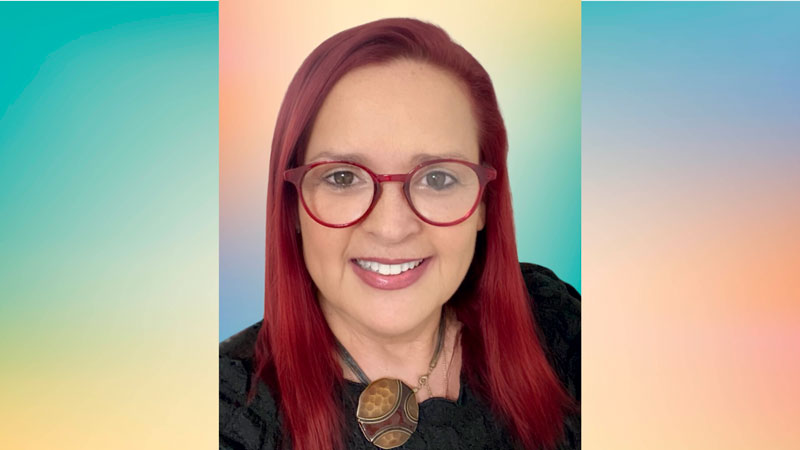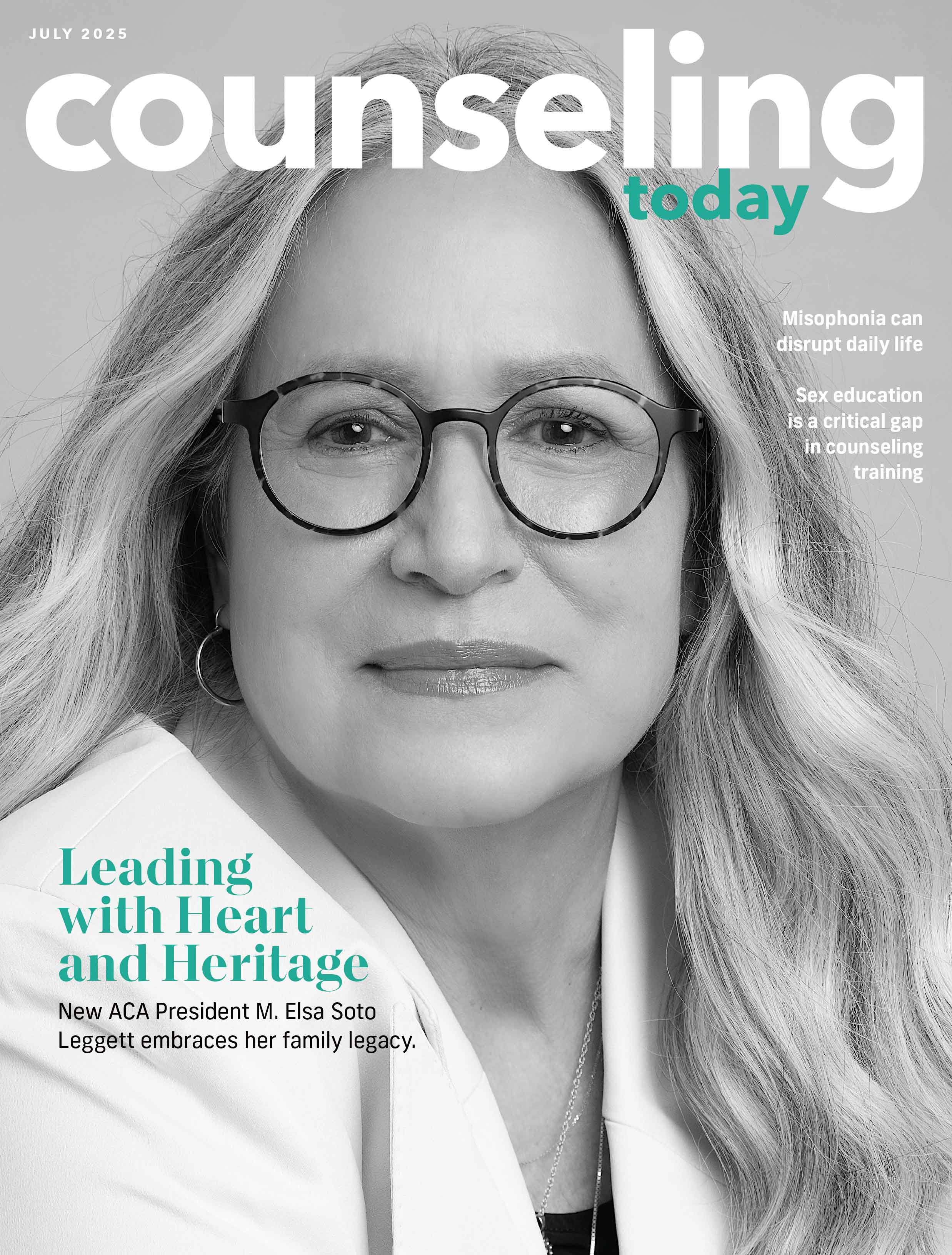From Dream to Reality
By Melanie Padgett Powers
November 2024

As a child, little Lourdes would arrange her dolls just so on her bed. They were her students and she was the teacher. She’d pick up a piece of chalk and write lessons on the back of her bedroom’s wood door. Suddenly, she could hear her mother’s sandals click-clacking down the hallway. Oh no, time to erase any damage to the door! “I’d be hurrying up to grab a piece of paper to wet it and clean my board,” she remembers.
Lourdes Araujo, EdD, LMHC, has been teaching — and helping friends, family and her community — since she was a small girl. But she took a longer, less-traditional path to find her way to counseling. Araujo now owns a private practice in Florida, Rise Above It Holistic Counseling, and teaches online as an assistant professor of counselor education at Grand View University (GVU) in Des Moines, Iowa. She is also the president of the Florida Counseling Association (FCA).
Araujo has created a gratifying counseling career through a mix of her personality strengths, family history and life experiences. She’s always been a caring, compassionate person who embraced her parents’ lessons to pay it forward. As the child of Cuban immigrants, she is passionate about counseling her local Hispanic community and is fluent in Spanish and English. She’s also a domestic violence survivor who specializes in helping survivors of human trafficking, domestic violence and sexual abuse.
Araujo’s counseling method is a mix of trauma-focused cognitive behavioral therapy and holistic tools. She uses sound bowls, meditation, music, incense, oils, tapping, drumming and more to counsel clients through their trauma. “Our clients are going to move on from us, and we have to give them an opportunity to use these holistic tools,” she says.
She uses virtual reality glasses so clients can “travel” to their happy place, such as the beach or mountains. And recording clients (with their permission) allows them to watch themselves and notice how they’ve changed. “They can see that later on in, say session 10, they’re a different person because they’ve grown from the experience,” she says.
Becoming a Survivor
Araujo grew up in Miami, the middle child and only girl. Her parents owned a small factory making curtains and bedspreads to sell to local companies. Her dad managed the business, and her mom was the seamstress. They worked hard and they worked a lot. “It was always a struggle,” Araujo says. Despite her love of school and high grade point average, Araujo knew there wasn’t money for college. “I always wanted to go to school. I could go to school for the rest of my life — that’s how I feel about school. But that was something I knew that I wasn’t going to be able to do.” Instead, after high school graduation, Araujo got married and had a son. However, her husband was abusive. “After a year and a half, I found the courage to leave despite my fear and the fact that no one around me knew what I was going through,” she says.
“I often prayed to God for a sign and found strength by looking into my son’s eyes, ensuring I had the resolve to make this decision.”
Despite the experience, Araujo says she remained an optimist. “I was able to divorce and raise my son, who is now an adult, as a single parent. I have no regrets!” Araujo wants to share with others: “To anyone going through abuse, I encourage you to find the strength to leave and become a survivor who can tell their story. This is the first time I am sharing this part of my life with the world, and I hope it helps others find the courage they need.”
About 18 years ago, before she went to graduate school for counseling, Araujo used her experience as a domestic violence survivor to become a victim advocate for the local sheriff’s department. “What I learned from that experience was that I was never going to be a victim. I was going to be a survivor, and I felt I could use my tools — without having a master’s degree in counseling, but with life experience — to show that every victim can be a survivor.”
Her own experience helped others begin to envision a different life, as she helped guide people — especially Hispanic women and girls — to see domestic violence through a new lens. “It doesn’t have to be all trauma,” she says. In fact, her counseling tagline is: “Life is not about regrets. Life is about the stepping stones that you take in your life.”
Heading Toward Counseling
Araujo was determined to continue her education. She started with an associate’s degree in computer programming, followed by a bachelor’s in business management. But her heart was set on becoming a counselor. She kept moving forward with her education, and in 2016 she earned a master’s degree in mental health counseling from Hodges University in Florida. In 2020, she earned a doctorate in counselor education and supervision from National Louis University. Her dissertation was titled “Cuban Immigrants’ Experience with Acculturation and How They Cope in the United States.”
Araujo taught as an adjunct professor in Hodges University’s clinical mental health counseling program. Then, in January 2022, she switched to teaching master’s-level students at GVU. There, she has significantly contributed to updating the crisis intervention course, leveraging her experience as a first responder and crisis intervention specialist to include criteria that better prepares students aiming to work in crisis and trauma fields. (She did similar work at Hodges, working with colleagues to improve the trauma course for master’s students.)
Araujo also supervises students during their practicum and internship. She can’t imagine having to choose between counseling, teaching and supervising. She loves all three.
“Achieving the goal of becoming an assistant professor at GVU is monumental for me and my career,” she says. “I especially appreciate that we are a unique and diverse group who advocate for our students. In particular, the work I do as a therapist in the fields of human trafficking and domestic violence — including support for the Hispanic and LGBTQ+ communities — highlights our commitment. Our team is continually advocating for these underserved and challenged populations.”
Extracurricular Pursuits
When she’s not working, Araujo loves hiking, exploring and reading military family novels and mysteries. She finds peace and stillness at the beach, although she doesn’t get there as often as she would like.
In the year leading up to her father’s death in 2023, she made him a heartfelt promise to be more present and prioritize her well-being. True to her word, Araujo has embraced healthier eating, taken on a weight loss challenge and incorporated aerobics into her routine. Her cherished 11-year-old standard poodle, Duke, who is the “other” love in her life (after her son) joins her for power walks.
For the past 10 years, Araujo has been working on a semi-autobiographical book about the three generations of Cuba: pre-Fidel Castro, the Castro era and post-Castro. “It’s something I’m very proud of.” The book is an opportunity to showcase people in Cuba who did not have the chance to tell their own story or fight for what they wanted, as she was able to do.
“I’m very proud of being American Cuban, and there’s a historical side of that as well. And I’m very proud of being bilingual. It’s important for me to understand, as a bilingual counselor, that multiculturalism piece and to understand every client I have in front of me,” Araujo says.
Committed to Florida Counseling
Meeting people where they are is an integral part of Araujo’s ethos, in her personal life and in her career. It carries through her counseling, her teaching and her role as FCA president. Although she was an ACA member already, she truly became involved in the association after she attended the Florida convention in 2015, as part of the FCA Emerging Leaders program, which one of her doctorate professors encouraged her to apply to.
“Being surrounded by so many professionals — I had not done that before. It was an opportunity to meet my own peers, students and graduate students and to collaborate,” she says. “I was able to meet so many people that I still am friends with today.”
She dove into national and state committee work and set her sights on higher leadership. She became president of the division FACES (Florida Association for Counselor Education & Supervision) and then pursued the FCA president-elect position.
Araujo’s involvement in these leadership positions has been valuable. “Every time I have an executive board or committee meeting, it’s about learning and seeing how we’re going to make a difference in future generations through this organization,” she says.
She also finds meaning in the opportunity to share her vision for counseling. This month, on Nov. 14–16, FCA will celebrate 75 years at its annual convention. Araujo plans to welcome fellow counselors and students with the theme “Florida united, celebrating strength in counseling and embracing individuality and collective resilience.”
She will embrace an even bigger stage next year, as she welcomes thousands of counselors to Orlando for the 2025 ACA Conference & Expo on March 27–29. And she doesn’t plan to stop there. She wants to run for ACA president-elect one day because, she says, “I want to do more. I want to be part of something bigger and share my experiences and help others coming up.”
Araujo looks back at that little girl who loved learning, as well as that young woman who went through so much, and that single mom who was determined to raise her son while seeking higher education and a counseling career.
“I want to look at that little girl that I was and say, ‘I can be a leader. I can make a difference.’ And I can bring in my own experiences — not as a victim, but as a person who learned along the way how I can be better.”


